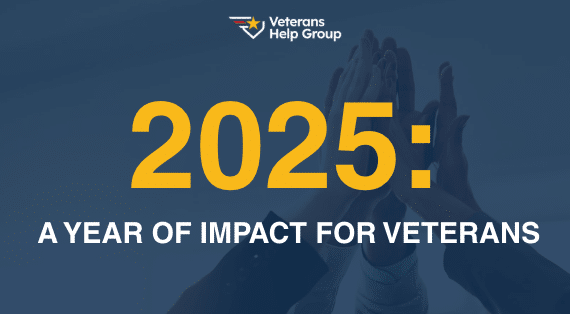VETERANS HELP GROUP
We Will Fight For you
DO I HAVE TO FILE TAXES ON MY VA DISABILITY BENEFITS?
If you’re receiving VA benefits, you may be unsure whether those benefits are considered income for federal income tax purposes. The short answer is simple: VA disability benefits are not taxed as income. That means if VA disability income is your only income, you generally won’t have to file federal income taxes at all. If you have additional income and are required to file a tax return, you won’t include VA disability payments in your gross income.
WHICH DISABILITY BENEFITS ARE EXEMPT FROM TAXATION?
When you hear “VA disability benefits,” you probably think about the monthly check or direct deposit. But, VA benefits are actually much broader than a once-per-month payment. And, we know that the Internal Revenue Service (IRS) taxes income in forms other than monetary compensation. So, let’s take a look at the various disability benefits offered by the VA and how they are treated for federal income tax purposes.
VA Disability Pay
VA disability compensation, or disability pay, is the monthly payment qualified disabled veterans receive. The amount of this payment is determined based on the veteran’s disability rating and other variables such as whether the veteran has a dependent spouse and/or children.
This benefit is not considered taxable income and should not be included in gross income on federal income tax forms.
Automobiles and Adaptive Equipment
The VA assists certain disabled veterans with obtaining transportation in two different ways. First, the VA may provide a one-time grant to purchase an automobile or other transportation. Second, the VA offers grants for purchasing adaptive equipment or repairing or replacing equipment that adapts the vehicle for the veteran’s disability. This benefit is available only to veterans who have suffered certain injuries or disabilities, including the loss or permanent loss of use of at least one extremity, permanent visual impairment, or severe burns resulting in limitation of certain motions.
This benefit is not taxable at the federal level.
Educational Benefits for Veterans
VA educational benefits can include everything from tuition and books to housing, tutoring services, testing and licensing fees and more. The IRS excludes these benefits from taxable income for disabled veterans and all other veterans of the U.S. military who are receiving VA education benefits.
Combat-Related Special Compensation (CRSC)
CRSC is a supplemental payment available to some veterans with combat-related disabilities. Unlike the other benefits discussed here, this benefit is administered by the military branch you served in, not the VA.
Compensated Work Therapy (CWT)
The CWT program is not limited to veterans with a service-related disability rating, but is open to disabled veterans. Participants in the program receive compensation for their labor, but do not pay federal income taxes on this income.
Other Tax-Free Benefits for Disabled Veterans
The IRS also excludes the following VA benefits and other benefits for veterans from taxable income:
- Grants for housing designed or adapted for wheelchair accessibility and use
- Benefits paid under a dependent-care assistance program
- Veterans insurance proceeds and dividends, and interest on dividends left on deposit with the VA
- Bonus payments made by state or local governments based on service in a combat zone
Some benefits payable to the dependents of disabled veterans are also excluded from gross income for federal tax purposes. For instance, Dependency and Indemnity Compensation (DIC) payments to surviving spouses and minor children are not taxable.
HOW DO I CLAIM THE EXEMPTION FROM TAX ON VA BENEFITS?
You don’t have to do a thing. The VA doesn’t withhold state or federal taxes from your veterans benefits, and the IRS won’t be expecting you to pay taxes on them. If you have no other income and don’t have another reason to file (such as filing jointly with your spouse), you can simply skip filing a return. If you’re filing a federal income tax return, just don’t include your veterans’ benefits in your gross income.
OTHER TAX BREAKS FOR DISABLED VETERANS
Many state and local governments offer tax credits or other tax-related assistance to disabled veterans. One common example is property tax relief for a home owned by a disabled veteran. Be sure to educate yourself about the state and local tax regulations as they relate to veterans, disabled veterans and their dependents.
SHOULD I EVER FILE A FEDERAL INCOME TAX RETURN AS A DISABLED VETERAN?
Though VA disability benefits are not taxable, there are a few circumstances in which you either must file a federal income tax return or will benefit from filing. However you will not include your VA disability benefits in your gross income when you file.
You’re Married and Your Spouse Has Taxable Income
In most circumstances, a married couple filing jointly will have a lower income tax burden than if each person filed separately, and that may be true even when your only income is from veterans benefits that are not counted toward gross income for federal tax purposes. For example, in 2022, a married person filing separately would pay 22% (or more) in tax on any taxable amount over $41,775. But, for a couple filing jointly, that cut-off point jumps to $83,550.
You Have Other Income that is Taxable
The most common scenario would be if you are partially disabled and also have earnings from work. But, that’s just one example. You might have to file a federal income tax return if you have significant interest income, or if you had capital gains from the sale or real estate or other property.
Your Disability Rating Changes
If you were receiving Concurrent Retirement and Disability Pay and your disability rating increased retroactively, you may need to file a federal tax return to receive a refund on some of the taxes that were withheld or paid. That’s because CRDP is taxable, but VA disability pay is not.
TALK TO AN EXPERIENCED VETERANS DISABILITY ADVOCATE
If you’re having trouble securing the VA disability benefits you’re entitled to, or aren’t sure how to pursue your benefits or appeals determination, Veterans Help Group is here for you. We’ve been assisting disabled veterans for more than 15 years, and understand how stressful and frustrating the process can be. Learn how a Veterans Disability Advocate can make the process simpler, less stressful, and more effective for you. Call (855) 855-8992 right now.
WHAT OUR CLIENTS SAY
FREE CASE EVALUATION
"*" indicates required fields







